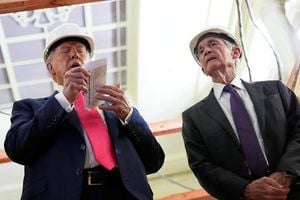On July 11, 2025, Russian President Vladimir Putin signed a sweeping executive order that reaffirms and expands the foundations of Russia’s state language policy, signaling a renewed commitment to preserving and promoting the Russian language both domestically and internationally. This decree comes amid ongoing debates about language, culture, and identity in the Russian Federation and beyond, reflecting Moscow’s determination to assert the primacy of the Russian language while also supporting the diverse linguistic heritage of the country’s many peoples.
The new policy explicitly pledges to "preserve, develop, and support" not only the Russian language but also the state languages of Russia’s republics and other languages of the peoples within the Federation. It aims to promote Russian on a global scale, underscoring the language’s role as a defining element of national civic identity. According to the decree, "despite the Russian Federation’s unique ethnocultural diversity, it is precisely the Russian language that largely defines the national civic identity," while affirming that all languages spoken by Russia’s peoples enjoy state support and that citizens are guaranteed the right to use their native languages.
The decree also addresses challenges perceived by the Kremlin, identifying threats such as the unwarranted use of foreign words in official settings when Russian equivalents exist, as well as the use of foreign words not found in standard Russian dictionaries. It further points to "attempts by some foreign countries to limit (or reduce) the sphere of Russian language use," highlighting geopolitical tensions that extend into the cultural and linguistic arenas.
Among the key objectives outlined are reducing the use of foreign words that have common Russian equivalents and ensuring the use of the Cyrillic script in public spaces, as mandated by law. The policy also champions the "high social value of Russian language culture," promoting literacy and language skills while condemning the use of obscene language. Additionally, it calls for the conversion of alphabets used by the peoples of Russia to a Cyrillic basis where necessary, aiming to unify and strengthen linguistic ties within the Federation.
This executive order follows legislation signed by Putin in late June 2025, which introduces new language policies set to take effect on March 1, 2026. Initially, the law was expected to require businesses to use Russian and other state languages on storefront signs, information boards, posters, and announcements related to sales and operating hours. Foreign languages, primarily English, were to be permitted only as supplements alongside identical Russian-language advertising. However, after receiving criticism from businesses and government officials, lawmakers amended the bill to allow the use of foreign words that lack common Russian equivalents. The final version also dropped a provision that would have banned anglicisms in advertising and the use of Latin script on signs.
Meanwhile, Russia’s Ministry of Foreign Affairs is actively assessing the effectiveness of its global efforts to promote the Russian language, commissioning a new research initiative with a particular focus on Uzbekistan and Azerbaijan. The state-funded All-Russian Public Opinion Research Center (ARPOR) secured a contract worth 34.8 million rubles (approximately $390,000) to conduct this study. ARPOR Director Valery Fedorov confirmed that the research has not yet begun as the contract is still being finalized, but emphasized that diplomatic tensions, such as recent strains between Russia and Azerbaijan, are transient, stating, "Escalations come and go." The survey will cover several post-Soviet states as well as countries including India, China, Venezuela, and the United Arab Emirates.
The research will involve surveying at least 1,500 people online and a minimum of 1,000 participants through phone or in-person interviews in each country. A ten-member expert team specializing in linguistics, international relations, culture, and media will analyze the results. The initiative is expected to culminate in a roundtable discussion in Moscow, reflecting the Kremlin’s strategic interest in measuring and enhancing its cultural influence abroad.
Rossotrudnichestvo, the Russian government agency responsible for fostering cultural and educational ties overseas, reported that over 14,000 individuals studied Russian at its "Russian House" cultural centers across 71 countries in 2024. Uzbekistan remains a core focus area for the agency, alongside Armenia, Belarus, Kazakhstan, Kyrgyzstan, Moldova, Tajikistan, and Turkmenistan. In Uzbekistan, more than 1,000 schools offer instruction in Russian or bilingual formats, though this number pales in comparison to Kazakhstan’s over 3,600 such schools.
While Russian holds official language status in Kazakhstan and Kyrgyzstan and is designated as a "language of interethnic communication" in Tajikistan, it lacks any official legal status in Uzbekistan and Turkmenistan. In Kazakhstan, the use of Russian has been gradually declining due to demographic shifts; ethnic Russians accounted for just 14.89% of the population as of January 1, 2024, down sharply from nearly 40% in 1989. Nevertheless, Russian remains widely spoken and supported by educational institutions and strong bilateral ties with Moscow.
Experts cited by Russian daily Vedomosti note that the conditions for Russian language education outside major urban centers like Tashkent and Baku are significantly more challenging. In many Uzbek schools, Russian is taught for only two hours per week, which experts argue is insufficient to meet growing demand. Analysts suggest that interest in the Russian language is driven more by pragmatic considerations—such as aspirations to study at Russian universities or seek employment with Russian companies—rather than by cultural affinity or the effectiveness of Moscow’s soft power outreach.
Overall, Putin’s new language policy and the accompanying research initiative highlight Russia’s ongoing efforts to assert the primacy of the Russian language amid complex domestic and international dynamics. By emphasizing Cyrillic script, reducing foreign linguistic influence, and promoting Russian language education abroad, the Kremlin aims to strengthen national identity and maintain cultural influence in a rapidly changing geopolitical landscape.




